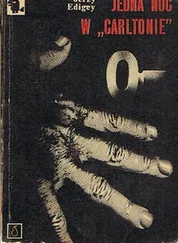“This is how it’s done. With your entire being, not just with your hands. We are in a holy place, therefore you gentlemen will magnanimously forgive me if I don’t suggest just what you can do for yourselves with nothing but your hands. In the profession — in the vocation —of the bell-ringer the hand is not an upper extremity but the extension of the soul. Let the littlest bell sing,” cried Sexton Messerschmidt, and at his call the littlest bell moved. “Tym’s bell-foundry in Warsaw,” Messerschmidt outshouted the first heartbeats, “Tym’s bell-foundry in Warsaw, bronze practically in statu crudi , bronze without alloy, which is why it has a pure sound, even if it doesn’t carry. As the story goes, this bell was cast by order of the enlightened protector of the Reformation, Mikołaj Radziwiłł the Black. It was hung by our Calvinist brethren in the church tower in Kiejdany. It served them faithfully, and with its pure voice it sustained them in the faith, which, although perfect, is after all also the correct one. Henryk Sienkiewicz mentions the church in Kiejdany in his Trilogy . Unfortunately, Sienkiewicz’s pen did not describe the sound of our bell, and it’s a pity, a pity. You, gentlemen, of course, haven’t yet read the Trilogy .”
“I’ve read it, I’ve already read With Fire and Sword , and The Deluge , and Pan Wołodyjowski . I’ve read it,” I wanted to call out, but I restrained myself and bit my tongue. My psychological instinct, not yet perfected, but already in place, whispered to me that demonstrating any sort of ability in the presence of Sexton Messerschmidt wasn’t a good thing. He was without a doubt a virtuoso, a virtuoso bell-ringer. Perhaps he was also a virtuoso in other arts, but above all else, he was the sort of virtuoso who feels like a fish in water among ignoramuses.
“But alas, alas, alas,” you could tell that Messerschmidt had perfected every intonational nuance of the story he was telling, “Mikołaj Radziwiłł dies too soon, and a few decades later the brother Catholics take away from the brother Calvinists their, that is to say, our church. Truth be told, they regain it, but from the great perspective of history, minor historical details are unimportant. What happens now, however, is a minor historical detail that creates great history, not only history in the historical sense, but also history in the epic sense. What happens now, gentlemen?”
Sexton Messerschmidt tore his hands away from the rope for a moment. Snatched upward by the swinging Radziwiłł rhythm, it danced above us its desperate, violently jerky dance.
“What happens, gentlemen? Well, one dark Kiejdany night four gentry-men — history hasn’t recorded their names, we only know that they were three Calvinists and one Lutheran — one gloomy night that heretical foursome takes Mikołaj Radziwiłł’s bell down from the Kiejdany town church. They load it on a sleigh, cover it with hay and pieces of straw, and off they go. The team of six horses sets off into the depths of the dark and icy Commonwealth. Although they couldn’t have measured it back then, the heavy frost is well below zero, and it causes the sleigh to glide nimbly over the Kiejdany high road. A seventeenth-century full moon, black forests, and white fields. Gentlemen, the history of that expedition awaits its epic poet. But — there is no reason to hide the fact — this would have to be a man at least as linguistically talented as Henryk Sienkiewicz. Just think, gentlemen, and above all try to give free rein to your completely Bolshevized imaginations. Four Protestants, four riders, not of the Apocalypse, rather four riders of the Gospel carry the Protestant bell on their sleigh across the frozen century. They don’t know where to go. Maybe to Warsaw? To Leszno? To Lublin? Or maybe to Prussia, to Königsberg? They don’t know the way, they have no destination, they know only that they must protect the sacred object. And all around them is darkness, cut-throats, Cossacks, Tatars, Turks, Swedes, riffraff, and savages. At the speed of lightning the news spreads along the route that our musketeers are carrying royal treasures. Ambuscades. Skirmishes. Adventures. In the course of one of them, one of the Calvinist brethren is mortally wounded. The mythical dramaturgy of this journey lies in the fact that its participants slowly peel away. The next Calvinist is an ecstatic enthusiast of aquavit. He swills, you should excuse the expression, like Mr. Trąba, only he swills more desperately. One night, his extremities warmed to excess, having imprudently fallen asleep, he freezes to death. The remaining duo takes part in the scene of fatal initiation described so many times elsewhere. Flakes of morning snow settle on the eyelids of their inertly lying comrade. They don’t melt. His face becomes covered with a white scale, and no one will ever know whether our erstwhile comrade in faith and comrade in arms had brown eyes or blue eyes, or whether in his breast pocket rustled a letter jotted down in someone’s very tiny hand, for whom he longed and from whom he had fled.”
Sexton Messerschmidt was clearly moved by his own rhetoric. A tear glistened in his eye. He didn’t even try to hide the fact at all.
“You gentlemen will forgive me,” he said in a rough voice, reining in his own emotion, “but, as the Bolsheviks are wont to say, I’m a ślioznyj czeławiek , a tearful man. The third, the youngest of the Calvinists,” he continued, wiping the tear with his sleeve and blowing his nose out on the floor, “the third, the youngest of the Calvinists, was undone by what will soon undo all of you as well: a hasty exchange of glances with a certain Catholic woman.
“A tavern in the vicinity of Częstochowa, and a widow tavern-keeper of impressive corporality, older than him by a few good years. At dawn, instead of setting off further, instead of further escorting the bell, he’s cutting wood in the courtyard, carrying water, and claiming that he’s discovered the meaning of life. Gentlemen! The meaning of life and a mixed marriage — this is like fire and water! You don’t understand a thing now anyway. Any moment, you will tumble into the arms of alluring young papist girls, but the time will come when you will remember my words. Never mind. On the field of battle, that is, on the route of the journey there remains the final rider of the Gospel, the Augsburg Lutheran evangelical. The route leads, God guides him, further to the south. It is already the height of a luxuriant, sweltering spring. The sleigh was long ago replaced by horse and cart. He is alone on the sandy road. His fingers graze the surface of the bell, smooth like a Protestant girl’s skin, and that freezing, dark Kiejdany night when they took the bell down from the tower, when, driven not only by a divine calling, they set off into the unknown — that time, so it seems to him now, is not of this world, and not of this life. Now the road leads upward, hill after hill, higher and higher, and finally — there it is. At his feet stretches the promised valley. Evangelicals busy themselves around their farmyards. Church choirs sing psalm after psalm. Birds fly up to the sky. Everywhere a good, amicable light shines forth. Hosanna.
“And in that manner,” the Sexton’s voice suddenly seemed to break off, and now he spoke entirely without conviction, “and in that manner my ancient ancestor reached the Cieszyn land. Let the middle bell sing!” he suddenly shouted, and there was no way not to think that with this shout he wished to drown out something that either had not yet been said, or that had already been said in excess. “I’ll tell you the story of the middle bell another time, another time. For today it is enough for you to know that it was cast and offered to us on the personal instructions of King Charles XII of Sweden, who not only routed the Evangelical-Eater, Emperor Joseph I, but also wrung from him six churches of Grace! That’s right. Six churches of Grace! Sagan—Żagan! Freistadt — Kożuchów! Hirschberg — Jelenia Góra! Landshut — Kamienna Góra! Militsch — Milicz! Teschen — Cieszyn! And now, and now,” Sexton Messerschmidt readied himself for the finale, “and now let the great bell sing!”
Читать дальше












